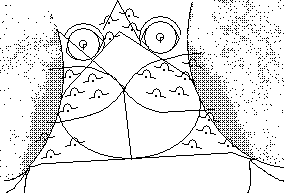is the subject of a sentence
(主語が文頭でない場合、主語の前に置いて主語を示す)
 back}:
back}:I/ my/ me (by its position in a sentence) (私);
this sign points the center of the chest (
 )
)
I found a wonderful
bilingal haiku web site by chance.
It is by Bin Akio, who is also the director of the
World Haiku Association web site, living in Chiba, Japan
.
Don't you feel like this in this civilized world, too?
現代の生き様を言いえてるなと、共感しました。
千葉県在住の
秋尾敏さんのサイトに偶然迷い込んで、しばらく時を忘れました。
これは、そのなかの一句、
下のほうに出ています。
(秋尾さんは、世界俳句協会のウェブサイト・ディレクターもなさっているそうです)
 Original Japanese
by Bin Akio:
Original Japanese
by Bin Akio:
 : toad (蝦蟇)、
: toad (蝦蟇)、
 : protuberance (突起物),
: protuberance (突起物),
 heading direction}: to/for (~へ/のため)
heading direction}: to/for (~へ/のため) {
{  frog (蛙)+
frog (蛙)+ large}: toad (蝦蟇:俳句ではヒキと読むよう作者は指定)
large}: toad (蝦蟇:俳句ではヒキと読むよう作者は指定) {
{ {
{ related,
related,  water and
water and  air} (an
fundamental symbol as its shape also):
air} (an
fundamental symbol as its shape also): (jump) up}: flog (蛙)
(jump) up}: flog (蛙) sense} (eye-shape): eye(s) (目)
sense} (eye-shape): eye(s) (目) }situation}:
be, be doing something; the verb explains about the present situation
shown by the following character or phrase (現在の状態を示す動詞記号)
}situation}:
be, be doing something; the verb explains about the present situation
shown by the following character or phrase (現在の状態を示す動詞記号)*to the top: the grammatical symbol for nominative; to indicate that the following character or phrase
is the subject of a sentence
(主語が文頭でない場合、主語の前に置いて主語を示す)
{
to form a pronoun by compounding with another character,
back}:
I/ my/ me (by its position in a sentence) (私);
this sign points the center of the chest (position code) by the thumb (for
)